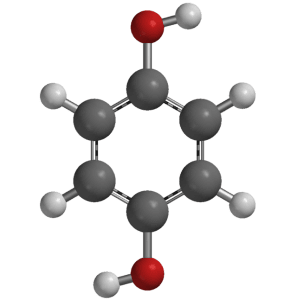Topical hydroquinone has been used for over 50 years to lighten dark areas on the skin such as age spots and melasma. “In some senses, Hydroquinine has become a standard for treating acne scars, hyperpigmentation and dyspigmentation on the skin,” says Dr. Miriam Hanson, board certified dermatologist and cosmetic skin care expert in Austin, Texas. “Whether used alone or in combination with other lightening agents like retinoids, a steroid, Kojic acid – the so called Kligman formula, it is a highly effective agent for lightening and bleaching the skin.”
 In 1982, the United States Food and Drug Administration(FDA) stated that creams that contain 1.5 to 2 percent hydroquinone were safe. However in 2006, the FDA reviewed all available data and decided that further studies are required on hydroquinone after researchers found that the product caused cancer in rats. Data also indicates that prolonged use of hydroquinone may lead to a condition known as ochronosis (a skin darkening disorder). Regardless of these observations, with its years of widespread use in the cosmetic and photography industries, there has never been a report of anyone developing cancer from hydroquinone.
In 1982, the United States Food and Drug Administration(FDA) stated that creams that contain 1.5 to 2 percent hydroquinone were safe. However in 2006, the FDA reviewed all available data and decided that further studies are required on hydroquinone after researchers found that the product caused cancer in rats. Data also indicates that prolonged use of hydroquinone may lead to a condition known as ochronosis (a skin darkening disorder). Regardless of these observations, with its years of widespread use in the cosmetic and photography industries, there has never been a report of anyone developing cancer from hydroquinone.
Currently, the safety of hydroquinone is being evaluated by studies conducted by the National Toxicology Program (NTP) and researchers are working to answer the find out the safety of topical hydroquinone for skin.
Dos And Don’ts
Hydroquinone is still widely used, but a few precautions should be followed.
- Pregnant women should avoid using products that contain hydroquinone unless directed by a physician.
It is not known if hydroquinone is excreted in breast milk so should not be used women who are breastfeeding. - Products containing hydroquinone should only be applied to the area of the skin under treatment.
- Never use products containing hydroquinone on children under 12 without the supervision of a medical professional.
- Always follow all directions on the drug’s label.
- Watch the treated area closely for any side effects. If redness, soreness or itching should occur, discontinue use and consult a physician.
- Severe allergic reactions to hydroquinone are rare.
- Never swallow products to that contain hydroquinone.
“Certainly, it is important for all patients to be comfortable with their skin care regimen and the products they are using.” Dr. Hanson notes that there are a variety of other skin ligthening options and chemical peels beyond hydroquinone that patients can also use.
Contact Us
Dr. Hanson treats medical and cosmetic patients with skin conditions and concerns at Sanova Dermatology. If you have any questions concerning hydroquinone, or other dermatologic issues, please contact us today.
Join Us
